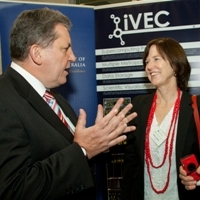ACADEMIA
New supercomputer bolsters world's biggest radio telescope
Federal Minister for Science and Research Chris Evans today launched a powerful new supercomputer at The University of Western Australia - 50 years after UWA acquired its first computer, an IBM 1620, which was also WA's first digital computer.
The new supercomputer, named Fornax - Latin for "furnace" - after a southern hemisphere constellation known as a birthplace for stars, is 10,000 times faster than an average office computer and big enough to store 2000 years of iTunes music.
Fornax is part of the Pawsey project, an $80 million Federal Government Super Science initiative to help bolster Australia's role in building the world's biggest radio telescope - the Square Kilometre Array (SKA) - in WA, and make Perth one of the world's top supercomputing centres.
The State Government has also contributed significant funding to support iVEC's management of supercomputing infrastructure in WA.
UWA, CSIRO, Curtin University, Murdoch University and Edith Cowan University are partners in a joint venture called iVEC to provide advanced computing services to scientists, industry and government.
Part of the Federal Government's Super Science Initiative to boost WA's supercomputing resources, the Fornax represents a big leap in WA's supercomputing power.
{hwdvs-player}id=430|height=340|width=430|tpl=playeronly{/hwdvs-player}
The director of UWA's iVEC Centre, Associate Professor Paul Bourke said Fornax had been especially designed to give researchers unprecedented access to both highly parallel processing and data-intensive computing.
"These are critical in many areas of research, particularly for astronomy signal processing (including the SKA) and geoscience," Professor Bourke said.
UWA Deputy Vice-Chancellor Research, Professor Robyn Owens said the supercomputer represented an exciting development in science.
"It is science which will extend our knowledge from the beginnings of our universe - and at the same time develop technologies and processes that will be of practical benefit to industry, business and the wider community," Professor Owens said.

